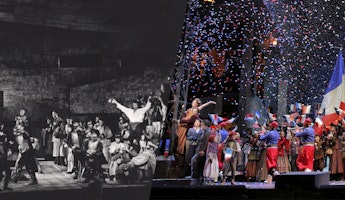Blog
December 19, 2024
"Maria" Review
The third inclusion in Pablo Larrain’s trilogy of “Important Women,” an unofficial trilogy whose previous installments focused on Jackie Kennedy and Princess Diana, follows the game changing opera superstar Maria Callas. These are not your usual biopics; Maria, which stars Angelina Jolie, continues the approach Larrain took for Jackie and Spencer by focusing on a specific moment in the protagonist’s life. For Maria, Larrain depicts the final week of Callas’ life in 1977, when the soprano was secluded in Paris, trying to rebuild her voice years after her last performance. On the surface this makes sense. Jackie and Spencer used this idea to great effect, creating a claustrophobic tone that matched the pressure that the leads found themselves in. This same sense of claustrophobia lends itself well to Callas’ last days as she suffered in silence, but it felt in this case as if some vital background information was left out.
To understand what Callas was going through in her final days, it’s imperative to know the suffering that she endured her whole life. While some of this is shown in the film’s flashbacks, most of which focus on her complex relationship with business magnate Aristotle Onassis, there’s much that's missing. For one, her toxic relationship with her mother is hardly mentioned except for a brief conversation with her sister and a bone-chilling flashback involving German soldiers. At the point in Callas’ life shown in the film, she had cut her mother off, so while the omission makes sense it also diminishes the role that her mother played in her anguish and music career. The movie also skips over the negative sides of her relationships with both Giovanni Battista Meneghini (her former husband) and Aristotle Onassis. In Onassis’ case, perhaps it was to make it easier for audiences to understand why she continued to be in love with him after he had left her for Jackie Kennedy, but it removes an ugly but vital layer of their relationship.
A lot of the conversation around the movie revolves around Angelina Jolie’s performance and for good reason. While the film may skip over some events in Callas’ life, you can tell Jolie did not forget about them in her performance. She conveys that trauma with an extraordinary subtlety that can only be found in an Oscar-winning actress. On the surface, she commands the screen just as Callas commanded the stage, and she doesn’t shy away from showing her inner turmoil. Jolie has talked about her preparation for this movie (and we even got to talk to her vocal coach, which you can check out here) and that preparation shows in a performance will go down as a career highlight.
Another strength of this movie is its use of opera to provide subtext to the story. While non-opera fans may not pick up on it, we couldn’t help but get a kick at how the way the film draws parallels between Callas’ life and the tragic heroines she often portrayed on stage. To give an example, the film uses the aria “Ave Maria” from Verdi’s Otello. (If you currently search “Ave Maria Otello” on Google, Maria Callas is the first artist to come up.) The aria, a prayer to the Virgin Mary, is a haunting moment from the last act of the opera. Desdemona sings it alone in her bedchamber, just moments before her husband Otello kills her. Not only does the aria feature the name “Maria,” it’s fitting that this premonition of death starts off the film as flashes of Callas’ earlier years are shown. Callas was a devout Greek Orthodox Christian, so this aria’s inclusion also reminds us of her religious beliefs.
Details like this make the film enjoyable to opera fans and it’s clear Larrain and screenwriter Steven Knight put a lot of consideration as to what aria should be played and where in the film. Larrain accompanies these scenes with lavish visuals, whether it be flashbacks to her glory days or one of the many hallucinations featured throughout the film, making it clear that music is what made Callas feel the most alive. The film doesn’t go into too much depth on her career but that works in its favor as it creates an air of mystique and intangibility around it.
Ultimately, Maria falls short of the heights that Jackie and Spencer reached due to its ambition to portray a whole life of suffering in just one week, though it still offers a perspective on Callas’ life that is worth seeing for fans of her or just fans of opera in general. We’re happy to see her story continue to be told, for as glorious as she was on the stage, she was also a victim of immense pressure from her family and the public. If you wish to learn more about her life, click here to read the blog we put together in preparation of this movie. We hope that knowing more about her life may give you a better viewing experience or fill in the gaps that the film left out.








/03-cosi/_dsc0996_pr.jpg?format=auto&fit=crop&w=345&h=200&auto=format)















